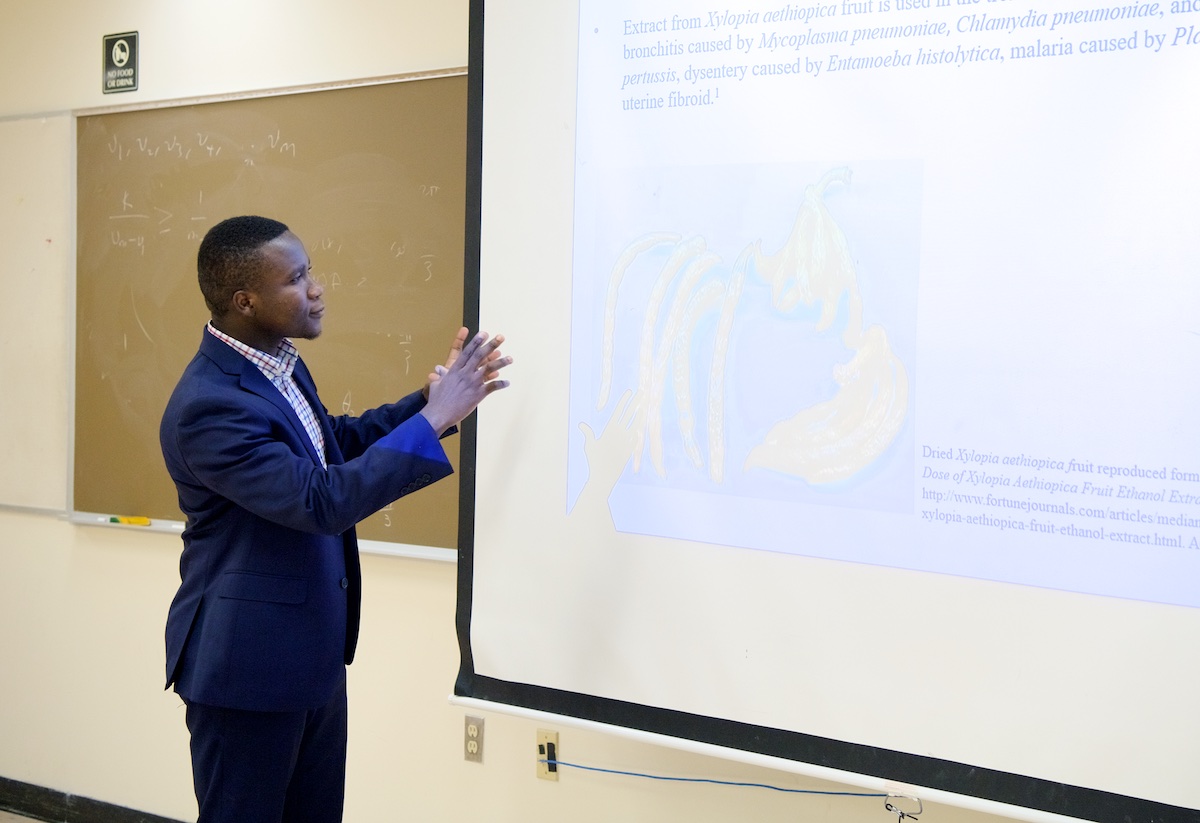
July 24, 2019
The Borough of Manhattan Community College (BMCC/CUNY) National Science Foundation Research Experiences for Undergraduates (NSF-REU) program as well as the Minority Science Education Improvement and Retention and Improvements in STEM Education Program (MSEIP-RISE), hosted a Summer Research Symposium on July 23 at 199 Chambers Street.
The event featured oral presentations from student researchers as well as a seminar led by Dr. Erin Walsh, associate director for the office of education at the National Institute of Child Health and Human Development. BMCC Interim President Karrin E. Wilks also spoke at the symposium.
Science Professors Alexander Gosslau, Christine Priano and Adolfina Koroch organized the event.
Gosslau said the quality of the student presentations was “amazing” and the vigorous question and answer session between the students was a vital part of the symposium experience. The student researchers spent eight weeks during the summer months working closely with a faculty mentor on their projects.
“Oral presentations in a more official setting of a symposium are an essential experience for the students for their later careers either in academia or industry,” Gosslau said.
Priano said the symposium is the culmination of all the research experiences of the summer.
“Presentation of scientific research is a key component in the advancement of knowledge. Professional scientists must communicate and defend their findings to their peers in both written and oral form. This is a critical skill for the REU students to learn,” said Priano.
Science major Fadel Yerima, who was mentored by Priano, spent his summer researching the antibacterial effect of Xylopia aethiopica, an evergreen aromatic tree that grows primarily in West Africa, on gram-positive and gram-negative bacteria.
“Xylopia aethiopica is a plant my mother gave me every time I would manifest any malaria symptom such as lack of appetite, vomiting or high fever. And I always felt better afterward,” said Yerima
He said the NSF-REU program has allowed him to work under the direct supervision of BMCC faculty. Many other schools, including four-year colleges and even graduate schools, do not offer the opportunity to work directly with a professor in a laboratory, Yerima said.
In ten years, he sees himself becoming either a neurosurgeon or microbiology researcher.
Science student Ahmad Anous’s project investigated how to use black tea to prevent oxidative stress which is harmful to human cells. His mentor was Gosslau.
Anous explains that oxidative stress, which is most often caused by smoking or eating fatty food, can cause heart problems, neurological illness, and even lead to cancer.
“In order to stop the negative impact of oxidative stress, people take supplements or eat foods rich in anti-oxidants, like juice or healthy snacks, but I’m using black tea because it too, is rich with antioxidants,” said Anous.
He said the NSF-REU funding allowed him to take time off from his job so he could focus solely on his research.
In ten years, Anous said he hopes to become a medical doctor.
Student researchers and mentors
Shepherd Coron
Salinity-tolerance of bacteria isolated from a fresh-water lake
Mentor: Christine Priano
Gearoff Cruz Rodriguez
Anti-HPV Activity in Cervicovaginal Lavages Collected from Women Receiving a Vaginal Multipurpose Formulation
Mentor: José A. Fernández Romero
Nigel Viegas
Examining the regulatory effect of black tea extract on the inflammatory response in intestinal cells
Mentor: Brian Rafferty
Jesus Hernandez
Usage of fruit and pepper peel in the Adsorption of copper from drinking water
Mentor: Abel Navarro
Tahreem Bhatti
Adsorption kinetics of copper (ii) ions onto agricultural waste from water resources
Mentor: Abel Navarro
Humberto Molina
Effects of Natural Extracts on the Viability of Sea Urchin Eggs
Mentor: Lalitha Jayant
Sergio Gomez Navarro
Chloride intracellular channel protein homolog EXL-1 influences healthspan and delays senescence in Caenorhabditis elegans
Mentor: Jun Liang
Ahmad Anous
Effect of a black tea extract on the stress response induced by oxidative stress
Mentor: Alexander Gosslau
Rosemary Perdomo
Potential antioxidant capacity of Xylopia aethiopica extracts
Mentor: Adolfina Koroch
Nadjet Cornejal and Lizbet Ferrante
The Effects of Triclosan on the Development of the Sea Urchin Lytechinus variegatus Embryos
Mentor: Lalitha Jayant
Fadel Yerima
Antibacterial effect of Xylopia aethiopica on gram-positive and gram-negative bacteria
Mentor: Christine Priano
Tammy Velasquez
Study of the effect in the animal heat management and the short-term associative memory in Caenorhabditis elegans
Mentor: Jun Liang
Ehab Elrawi
Microbiota and their Effects on Degradation of Black Tea Extract
Mentor: Peter Nguyen
Angela Ng
Temperature dependence of energy band gap of CdSe quantum dots
Mentor: Shengkun Zhang
Fernando Campos
Mentor: Professor Hao Tang
Eugene Emono
An Approach to the Lonely Runner Conjecture
Mentor: Brett Sims
Briana Gonzalez
Potential Phenolic and Antioxidant Capacity of the culinary herb Culantro
Mentor: Adolfina Koroch
- Student presenters were from NSF-REU and MSEIP-RISE programs
- Featured guest speaker was Dr. Erin Walsh from the NIH
- Professors say defending research is critical skill for future scientists

